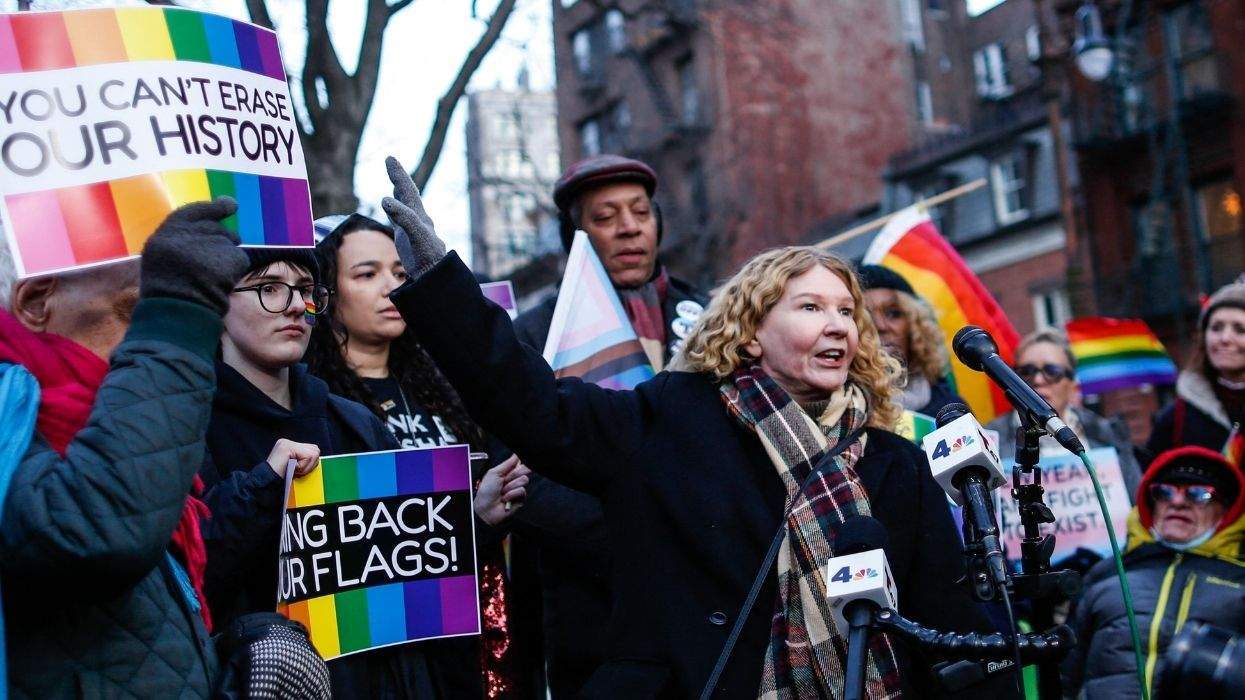Producer and writer Norman Lear, who died Tuesday at age 101, was responsible for some of the most groundbreaking television shows of the 20th century, featuring LGBTQ+ characters and spotlighting feminism, the lives of Black families, abortion, divorce, and many other aspects of American life not usually seen on TV at the time.
Lear also was a passionate liberal activist who founded People for the American Way in 1981 to stand up to the emerging religious right movement.
Lear was a successful TV and film writer and produced shows with Tandem Productions partner Bud Yorkin before shaking up television with All in the Family, a situation comedy that was unlike any previous sitcom. Veteran actor Carroll O’Connor starred as Archie Bunker, a blue-collar worker in Queens, N.Y., who expressed bigotry against every minority group but sometimes found his prejudices challenged.
The show, based on a British sitcom, premiered on CBS in January 1971, and in just its fifth episode, it had a storyline about a friend of Archie’s, Steve (Philip Carey), a macho, conservative ex-football player who turns out to be gay. After Steve beats Archie at arm-wrestling and punches him, Archie still can’t quite accept the truth, but the revelation does make him think.
Later in the series, it featured a character named Beverly LaSalle (played by drag queen Lori Shannon), described as a “transvestite” in the parlance of the time, who was friendly with Archie’s wife, Edith (Jean Stapleton). While Archie called Edith a “dingbat,” she was often wiser than he was and definitely more tolerant. Beverly appeared in episodes in 1975, 1976, and 1977 but was killed off in what was portrayed as a hate crime. Beverly’s death made Edith question her faith in God.
“I do love the episodes that Beverly appears in, but it’s super disappointing that in the end her character was killed off to advance the character development of a straight character,” gay writer Matt Baume told HuffPost in 2019. “She wasn’t the first to fall victim to the [‘kill your gays’ trope], but she was an early indication of the way TV would treat queer characters for the decades to come.”
Another 1977 episode was lesbian-inclusive. After the death of Edith’s cousin Liz, Edith and Archie learn that Liz’s “roommate,” Veronica (K Callan), was actually her lover. Edith is shocked but eventually comes to sympathize with Veronica and agrees that Veronica should keep a valuable silver tea set that Edith was initially set to inherit. Veronica and Liz were portrayed as teachers, and the episode was rerun in November 1978, just before Californians were set to vote on Proposition 6, a.k.a. the Briggs Initiative, which would have barred gays and lesbians from teaching in the state’s public schools. The proposition was voted down.
All in the Family also starred Sally Struthers as Archie and Edith’s daughter, Gloria, and future film director and marriage equality activist Rob Reiner as her husband, liberal college student Mike Stivic.
Maude, a spin-off of All in the Family, starred Bea Arthur as the title character, an outspoken liberal feminist who had been introduced on All in the Family as another cousin of Edith’s. It gave Maude a foil in conservative neighbor Arthur (Conrad Bain). In a 1977 episode, Arthur wants to shut down a gay bar in their affluent suburban hometown, Tuckahoe, N.Y. Maude defends the bar and becomes a customer there, and the episode includes several jokes about antigay crusader Anita Bryant.
Earlier, the series had dealt with a contentious social issue when Maude, a middle-aged woman with a grown daughter and a grandson, confronted an unexpected pregnancy. The two-episode arc showed Maude and her husband, Walter (Bill Macy), grappling with what to do, and Maude ultimately deciding to have an abortion.
Other Lear sitcoms included Good Times, Sanford and Son, and The Jeffersons, both centering on Black families, the former two financially struggling, the latter upwardly mobile. The members of the Jefferson family were initially introduced as the Bunkers’ neighbors in Queens, and with their own show they moved up to the east side of Manhattan. George Jefferson, the owner of a successful dry-cleaning business, was portrayed as bigoted in his own way as Archie, even though he was Black. He was played by Sherman Hemsley, who was widely believed to be gay but didn’t come out publicly during his lifetime (he died in 2012).
These shows, however, were sometimes criticized for negative and stereotypical portrayals of Black people, and writer Eric Monte, who is Black and worked with Lear, called the producer a racist and a hypocrite and accused him of stealing Monte’s concept for The Jeffersons. A lawsuit by Monte was settled out of court.
On race, “Lear leaves behind a legacy that is problematic, groundbreaking, and memorable,” Elizabeth Wellington wrote in The Philadelphia Inquirer upon his death.
Lear’s legacy also includes woman-centered shows such as One Day at a Time, starring Bonnie Franklin as an independent single mother (and rebooted a few years ago with a Latinx family and a lesbian character), and Mary Hartman, Mary Hartman, a spoof of soap operas. And outside of television, there was People for the American Way.
“For more than 40 years, Lear worked with People For the American Way to mobilize public support and activism on behalf of freedom of expression, religious pluralism, and equality and justice for all,” says a memorial post on the group’s website. “He celebrated People For the American Way’s contributions to advances like marriage equality and the historic confirmations of Supreme Court Justices Sonia Sotomayor and Ketanji Brown Jackson, and he raised his voice against censorship, antisemitism, and the rising threat of authoritarianism.”
“Pushing back on bigotry, resisting voter suppression, exposing extremism, making our communities safer — these are not things I can do effectively on my own,” Lear wrote to the group’s members last year. “But through People For the American Way, I partner with fellow Americans to defend our freedom wherever and whenever it is at risk.”
“Norman knew the power of culture to generate conversation, reach hearts, and change minds — and he was a master at using that power for good,” People for the American Way board Cochair Lara Bergthold said in the post.
“I thank God for Norman Lear,” added the other cochair, Rev. Timothy McDonald, who is also founder of the African American Ministers Leadership Council. “Norman refused to allow the radical religious right to claim ownership of faith, flag, and freedom. He fought to make this country a place where equality and justice were truly available to all the people.”
GLAAD President and CEO Sarah Kate Ellis also issued a statement in praise of Lear. “Norman Lear was a true pioneer whose legacy will forever be connected to including LGBTQ characters on television when no one else would," she said. "With storylines on All in the Family, Maude, The Jeffersons, the new One Day at a Time, and the upcoming Clean Slate starring Laverne Cox, Lear humanized the LGBTQ community for the millions of people who tuned in to watch his shows. Norman Lear made it a priority to champion LGBTQ creators and he pushed Hollywood to follow in his groundbreaking footsteps."
Clean Slate, now in production for Amazon Freevee, stars Cox as a trans woman renewing her relationship with her father.















Charlie Kirk DID say stoning gay people was the 'perfect law' — and these other heinous quotes
These are some of his worst comments about LGBTQ+ people made by Charlie Kirk.